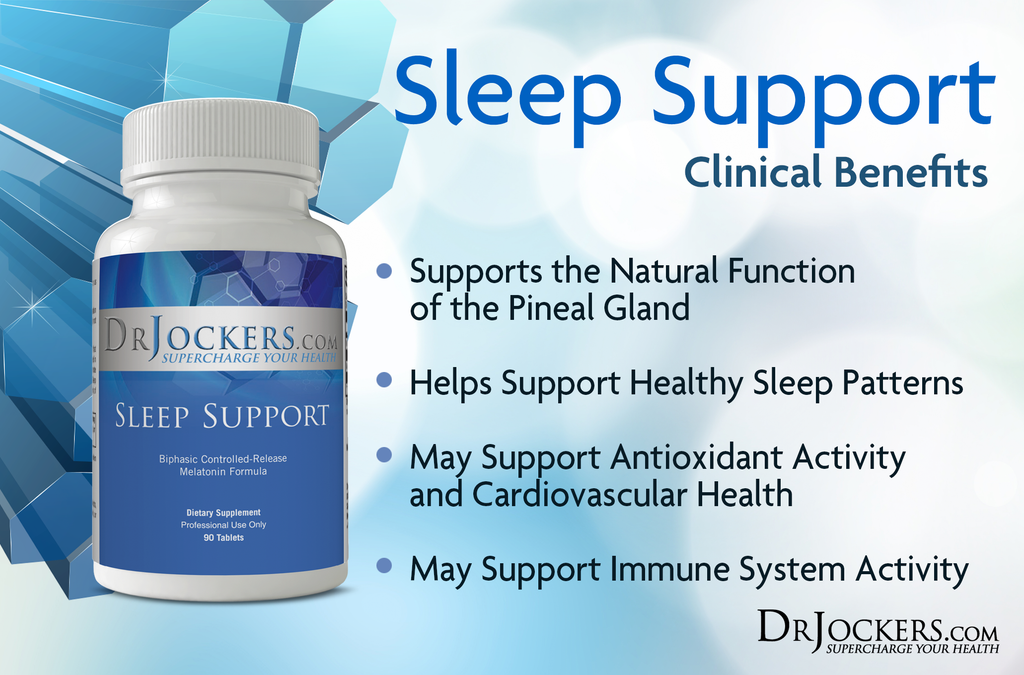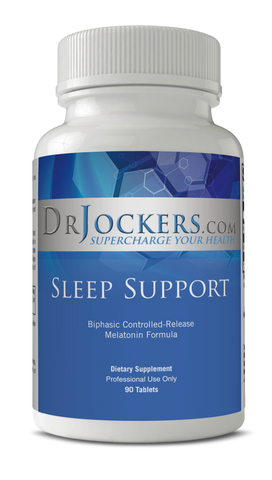
I use sleep support with individuals who struggle with insomnia. This includes both individuals who struggle to fall asleep and those who struggle to stay asleep. - Dr. Jockers
Let's discuss the key benefits of Sleep Support:
Why choose Sleep Support?
Read our customer reviews and you'll see why our clients agree these are...
Supplements You Can
TRUST
Sleep Support

What is Sleep Support?
Sleep Support is a clinically effective form of low-dose melatonin with a biphasic delivery system to release melatonin slowly and steadily. Melatonin is produced naturally in the pineal gland of the brain in response to changes in light exposure; it helps maintain healthy sleep patterns as well as antioxidant and immune activities.
Melatonin can be taken as a supplement to support these functions by promoting normal levels of melatonin in the body.

When does Dr. Jockers use this product?
I use sleep support with individuals who struggle with insomnia. This includes both individuals who struggle to fall asleep and those who struggle to stay asleep. With individuals who struggle to fall asleep, I have them take it about an hour before bed.
For those who struggle to stay asleep, I will have them take it right before going to sleep and if necessary, when they wake up in the middle of the night.
What is Melatonin?
Melatonin, a naturally occurring indolamine, is produced primarily in the pineal gland but also mammalian bone marrow, platelets, gastrointestinal tract, eyes, skin, and lymphocytes. [1] It plays a vitally important role in regulating the body’s daily and annual biological rhythms and thus the sleep/wake cycle.
Research suggests that melatonin supports antioxidant activity, cardiovascular health, and immune function as well. [2-4] Normal melatonin secretion is suppressed by light and stimulated by periods of darkness.
Normal Melatonin Rhythm:
Nocturnal secretion of melatonin is at its highest during childhood and then decreases with age. Studies, including meta-analyses, suggest that supplemental melatonin supports desirable sleep patterns in certain individuals, including the elderly and those who have unusual work hours, such as night shift workers or people traveling across time zones. [5-10]
A review of 10 trials suggests that melatonin supplementation helped support sleep patterns in individuals crossing time zones; subjects included airline passengers, airline staff, and military personnel. [11]
Daily doses between 0.5 mg to 5 mg taken at bedtime were used and found to be similarly supportive; however, the effects were greater at the higher dose. According to this review, doses higher than 5 mg do not appear to demonstrate any increased benefit.
Melatonin and Sleep Quality:
Human research studies suggest that melatonin supports the quality of healthy sleep as it relates to falling asleep, sleep efficiency (percent of time asleep to total time in bed), and awakening. In one study employing five experimental periods, melatonin appeared to positively support normal sleep initiation, maintenance, efficiency, and activity within one week of supplementation versus placebo.[5]
Another randomized, double-blind, placebo-controlled study of 33 individuals over 16 days suggested that the onset, quality, depth, and duration of sleep can be supported by melatonin supplementation without the occurrence of daytime drowsiness or adverse effects. [12]
Melatonin As An Antioxidant:
Melatonin has been closely studied for its role in supporting antioxidant activity, especially since intracellular melatonin is concentrated in the mitochondria, a major site of oxidative metabolism. Melatonin has been found to support extracellular antioxidant activity, support glutathione production, and stimulate the production of intracellular antioxidant enzymes—including superoxide dismutases and glutathione peroxidase. [3]
Research suggests that melatonin works on several levels. It can scavenge oxygen based and nitrogen-based free radicals, and support the natural response to inflammation by promoting cytokine balance. [2] As a lipophilic molecule, melatonin is able to permeate the lipid portion of low-density lipoprotein (LDL) and support antioxidant activity in cells.
Cardiovascular and Immune Benefits:
Research suggests that melatonin supports blood pressure already in the normal range and overall cardiovascular health. [3] Finally, research suggests that melatonin aids immune system activity by supporting T-helper cell function, immune-specific progenitor cell production, cytokine balance, and production of mediators, such as gamma-interferon and immune-supportive interleukins. [1,2,4,13]
DrJockers.com Sleep Support offers melatonin in a convenient form that provides 5 mg per lozenge, sweetened with xylitol, mannitol, and natural peppermint flavor, to support healthy sleep patterns, antioxidant activity, cardiovascular health, and immune function.
What is the recommended dosage?
Normal Dosage: Dissolve 1 lozenge under the tongue 5-60 minutes before bed
Advanced Dosage: Dissolve 2 lozenges under the tongue 5-60 minutes before bed or 1 lozenge before bed and 1 lozenge upon awakening in the middle of the night.
When introducing a new supplement, we recommend taking the lowest dose for 2-3 days. As tolerated, increase the dose until you have reached the recommended normal or advanced guidelines. Reduce to a tolerable dosage if adverse effects occur.
Sources For This Review:
- Srinivasan V, Pandi-Perumal SR, Brzezinski A, et al. Melatonin, immune function, and cancer. Recent Pat Endocr Metab Immune Drug Discov. 2011 May;5(2):109-23. [PMID: 22074586]
- Korkmaz A, Reiter RJ, Topal T, et al. Melatonin: an established antioxidant worthy of use in clinical trials. Mol Med. 2009 Jan-Feb;15(1-2):43-50. Review. [PMID: 19011689]
- Dominguez-Rodriguez A, Abreu-Gonzalez P, Reiter RJ. Melatonin and Cardiovascular Disease: Myth or Reality? [in Spanish]. Rev Esp Cardiol. 2012 Mar;65(3):215-218. Epub 2012 Jan 13. [PMID: 22245066]
- Maestroni GJ. The immunotherapeutic potential of melatonin. Expert Opin Investig Drugs. 2001 Mar;10(3):467-76. Review. [PMID: 11227046]
- Haimov I, Lavie P, Laudon M, et al. Melatonin replacement therapy of elderly insomniacs. Sleep. 1995 Sep;18(7):598-603. [PMID: 8552931]
- Kayumov L, Brown G, Jindal R, et al. A randomized, double-blind, placebo-controlled crossover study of the effect of exogenous melatonin on delayed sleep phase syndrome. Psychosom Med. 2001 Jan-Feb;63(1):40-8. [PMID: 11211063]
- van Geijlswijk IM, Korzilius HP, Smits MG. The use of exogenous melatonin in delayed sleep phase disorder: a meta-analysis. Sleep. 2010 Dec;33(12):1605- 14. [PMID: 21120122]
- Olde Rikkert MG, Rigaud AS. Melatonin in elderly patients with insomnia. A systematic review. Z Gerontol Geriatr. 2001 Dec;34(6):491-7. Review. [PMID: 11828891]
- Kunz D, Mahlberg R, Müller C, et al. Melatonin in patients with reduced REM sleep duration: two randomized controlled trials. J Clin Endocrinol Metab 2004 Jan;89(1):128-34. [PMID: 14715839]
- Pandi-Perumal SR, Srinivasan V, Spence DW, et al. Role of the melatonin system in the control of sleep: therapeutic implications. CNS Drugs. 2007;21(12):995- 1018. [PMID: 18020480]
- Herxheimer A, Petrie KJ. Melatonin for the prevention and treatment of jet lag. Cochrane Database Syst Rev. 2002;(2):CD001520. Review. [PMID: 12076414]
- Andrade C, Srihari BS, Reddy KP, et al. Melatonin in medically ill patients with insomnia: a double-blind, placebo-controlled study. J Clin Psychiatry. 2001 Jan;62(1):41-5. [PMID: 11235927]
- Cardinali DP, Esquifino AI, Srinivasan V, et al. Melatonin and the immune system in aging. Neuroimmunomodulation. 2008;15(4-6):272-8. Review. [PMID: 19047804]
Select Your Options & Add to Cart
† These statements have not been evaluated by the Food and Drug Administration.
This product is not intended to diagnose, treat, cure or prevent any disease.







